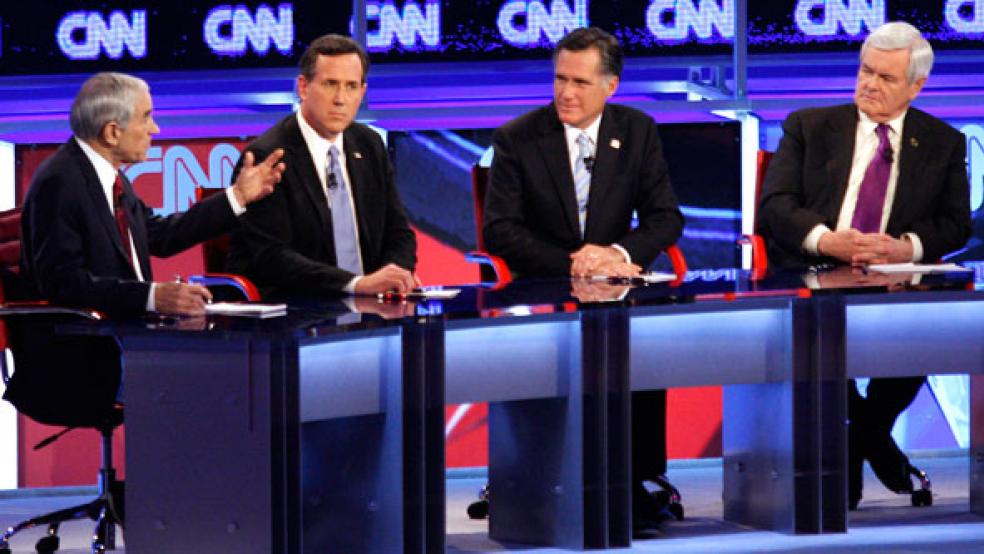The Republican presidential candidates spent much of last night trying to outdo each other on plugging the gush of red ink spewing from Washington. But three out of four contenders would send deficits soaring over the next decade, a new report out today from a Washington, D.C., budget watchdog group reveals.
The only candidate whose plan would reduce the national debt is Texas Congressman Ron Paul, according to the analysis by the Committee for a Responsible Budget, a think tank comprised of former members of Congress and cabinet members, as well as economists.
The group studied the budgetary policy platforms from former Massachusetts Gov. Mitt Romney, former Pennsylvania Sen. Rick Santorum, former House Speaker Newt Gingrich, and Congressman Paul — and charted out how each would impact the national debt between fiscal 2013 and 2012.
The conclusion? Most of these candidates are guilty of making overzealous promises to cut taxes without detailing specific or sufficient ways to pay for them.
“None of the numbers are ever going to be perfect and none of the best scorers in the whole city [of Washington] can ever get all this perfect,” said Maya MacGuineas, CRFB’s president, who says her organization’s analysis is still a work in progress. “But it’s clear that you can say tax cuts don’t pay for themselves.”
Gingrich, the study finds, is the worst offender when it comes to inflating deficits. When taken together, his commitments to slash education spending and social welfare programs would not be enough to counteract the effects of his plans to cut taxes for the wealthy and introduce private Social Security retirement accounts. Under his policies, the national debt would rise by about $7 trillion over two terms in office, mostly as a result of his plans to cut the top corporate income tax rate from 35 percent to 12.5 percent, eliminate estate and capital gains taxes, and replace the current tax code with an optional 15 percent flat tax.
Santorum’s policies would also wreak serious havoc, pushing the national debt $4.5 trillion higher than current levels by 2021. Both Santorum and Gingrich would send the amount of U.S. debt foreign investors hold above 100 percent of the size of the country’s overall Gross Domestic Product — up from about 60 percent currently. Romney’s policies, including his newly released tax reform plan to cut personal income tax rates by 20 percent, would collectively add about $2.6 trillion to the nation’s credit card.
On the other end of the spectrum, a Paul administration would shrink the national debt to $2.2 trillion as his plans to virtually eliminate defense spending and overhaul Medicare and Medicaid would more than offset plans to abolish income taxes.
Budget veterans like former Congressional Budget Office director Alice Rivlin called the report a “great service” to voters, but conceded that there’s really no way to calculate the potentially enormous budgetary impact of some candidates’ proposals. One example she pointed to was Congressman Paul’s intention to eliminate the Federal Reserve. “If this great nation, the largest economy in the world, didn’t have a central bank, what would happen? Well, none of us know,” Rivlin said today at an event in Washington where the report was released. “The impact on the budget would likely be major but inherently un-scoreable.”




